PUBLICATIONS
LIBRARY
Sanitation
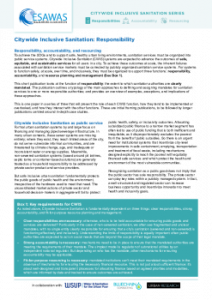
Sanitation
Citywide Inclusive Sanitation: Responsibility
This short publication looks at the function of responsibility: the extent to which sanitation authorities are clearly mandated. The publication outlines a typology of the main approaches to defining and assigning mandates for sanitation services to one or more responsible authorities; and provides an overview of examples, exceptions, and implications of these approaches.
This is one paper in a series of three that present the role of each CWIS function, how they tend to be implemented or overlooked, and how they interact with the other functions. These are initial framing publications, to be followed by longer publications centred around in-depth case studies.
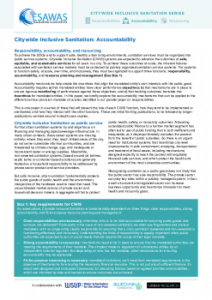
Sanitation
Citywide Inclusive Sanitation: Accountability
Accountability mechanisms help create the incentives that align the mandated entity’s own interests with the public good. Accountability requires a) that mandated entities have clear performance objectives; b) that mechanisms are in place to ensure rigorous monitoring of performance against those objectives; and c) that tracking outcomes translate into incentives for mandated entities. In this paper, we briefly explore the accountability mechanisms that can be applied to the different service provision mandate structures identified in our parallel paper on responsibilities.
This is one paper in a series of three that present the role of each CWIS function, how they tend to be implemented or overlooked, and how they interact with the other functions. These are initial framing publications, to be followed by longer publications centred around in-depth case studies.
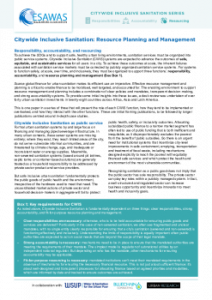
Sanitation
Citywide Inclusive Sanitation: Resource Planning and Management
Scarce global finance for urban sanitation makes its efficient use an imperative. Effective resource management and planning is critical to enable finance to be mobilised, well targeted, and accounted for. The enabling environment to support resource management and planning includes a combination of clear policies and mandates, transparent decision-making, and strong accountability systems. To provide some initial insights into these issues, a desk review was undertaken of over forty urban sanitation investments in twenty-eight countries across Africa, Asia and Latin America.
This is one paper in a series of three that present the role of each CWIS function, how they tend to be implemented or overlooked, and how they interact with the other functions. These are initial framing publications, to be followed by longer publications centred around in-depth case studies.
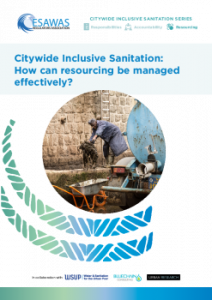
Sanitation
Citywide Inclusive Sanitation: How can resourcing be managed effectively?
Effective resource planning and management are required to ensure that mandated entities are sufficiently resourced to be able to fulfil their mandate.
This publication forms part of a series looking at Citywide Inclusive Sanitation in terms of three closely related requirements for achieving safe, inclusive and sustainable urban sanitation: clear responsibility, strong accountability, and fit-for-purpose resource planning and management.
These three functions (responsibility, accountability, resource planning and management) are introduced in three short initial publications released in May 2021. This paper is one of three complementary publications that explain these functions in more detail, on the basis of specific case studies: this publication focuses on resource planning and management.
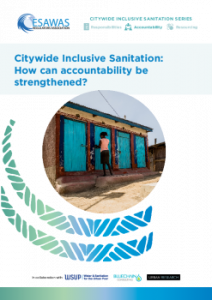
Sanitation
Citywide Inclusive Sanitation: How can accountability be strengthened?
Accountability mechanisms are required to make sure that mandated responsibilities are fulfilled.
This publication forms part of a series looking at Citywide Inclusive Sanitation in terms of three closely related requirements for achieving safe, inclusive and sustainable urban sanitation: clear responsibility, strong accountability, and fit-for-purpose resource planning and management.
These three functions (responsibility, accountability, resource planning and management) are introduced in three short initial publications released in May 2021. This paper is one of three complementary publications that explain these functions in more detail, on the basis of specific case studies: this publication focuses on accountability.
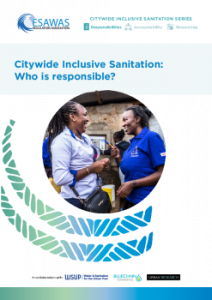
Sanitation
Citywide Inclusive Sanitation: Who is Responsible?
Responsibility defines what entity has a mandate to deliver a service.
This publication forms part of a series looking at Citywide Inclusive Sanitation in terms of three closely related requirements for achieving safe, inclusive and sustainable urban sanitation: clear responsibility, strong accountability, and fit-for-purpose resource planning and management.
These three functions (responsibility, accountability, resource planning and management) are introduced in three short initial publications released in May 2021. This paper is one of three complementary publications that explain these functions in more detail, on the basis of specific case studies: this publication focuses on responsibility.
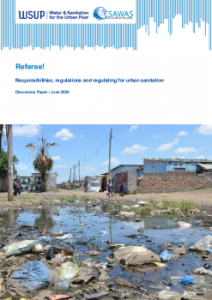
Sanitation
Responsibilities, regulations and regulating for urban sanitation
A new report published by Water & Sanitation for the Urban Poor (WSUP) and the Eastern and Southern Africa Water and Sanitation (ESAWAS) Regulators Association identifies how stronger regulators can play an important role in improving sanitation for under-served urban residents.